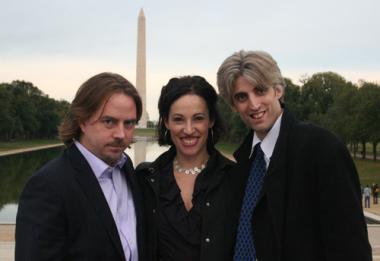“There’s a great belief in Amherst that conversation and dialogue can actually produce change,” says Zak Berkman. “The idea that if you can get everyone in the room to talk about something, it can affect the community as a whole.”
Berkman is a co-founder of New York’s Epic Theatre Ensemble, which combines professional Off-Broadway productions with artistic residencies in the city’s public schools. He’s a 1989 graduate of Amherst High and a child of the Valley’s academic culture. His father, Len, is a theater professor at Smith College and his mother, Joyce, is on the history faculty at UMass.
He credits his commitment to politically engaged theater and arts education to his parents’ example, and to his high school social studies teacher, Mark Gerstein, “who found a way of making history, and historical debate, theatrical. I want every young person to have that experience,” he says, “when history suddenly became a vibrant, relevant, visceral experience.”
I visited Zak Berkman last weekend at the Irondale Center in Brooklyn, where his company is rehearsing Passion Play by Sarah Ruhl, one of America’s most important contemporary playwrights. The play, a truly “epic” work that runs three and a half hours, looks at communities staging the passion of Jesus in three historical eras: Elizabethan England, Nazi Germany and contemporary America—all periods with deep and treacherous divisions over faith and politics.
Berkman says that Epic is founded on the idea that “if a group of people have a shared experience that can only happen on one night, which leads to a conversation about important things, that can have a ripple effect and it can lead to the sense of a community that is both embracing of different opinions and also finds the way to have a connection between those opinions.”
Another founding principle for the company is to break the disconnect between the experience schoolchildren have with the talented teaching artists to who come into their schools and the experience they have on field trips to theater productions, “where they see strangers onstage.” Epic has ongoing relationships with eight partner schools in New York City, and Berkman says that “the artists who work on our stages also work in our schools. So the kids have an ongoing conversation with the artists about the themes of the work, and then they come to the theater and they see their teachers and they go, ‘Wow, that’s my teacher up there,’ and they feel involved instead of alienated.”
“Passion Play is kind of the play Epic was born to do,” Berkman says. “All our plays ask how an individual relates to their society and the consequences of their actions on their society. In many ways, that’s what we’re trying to do with our students. How does playing Hamlet or Lady Macbeth relate to your life, to how you engage as a citizen in the world and a participant in your community?”
Passion Play: April 27-May 30, The Irondale Center at Lafayette Avenue Presbyterian Church, 85 South Oxford St., Brooklyn, N.Y., (866) 811-4111, epictheatreensemble.org.



